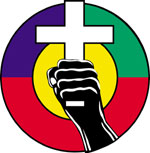
DAVID ADAMS speaks to Graeme Mundine, executive secretary of the National Aboriginal and Torres Strait Islander Ecumenical Commission (NATSIEC), about what the national apology to the stolen generations means…
Last updated: 18th February, 2008
“An awakening of the Australian conscience.”
That’s how Graeme Mundine, executive secretary of the National Aboriginal and Torres Strait Islander Ecumenical Commission (NATSIEC) – the peak ecumenical indigenous body in Australia, characterises the national apology to the stolen generations that Prime Minister Kevin Rudd read in the nation’s Parliament House last week.

NATSIEC logo
“I think it’s a symbol of a change of attitude. We’ve just come through a whole decade of denial of the plight of indigenous peoples and now we’re beginning a new era, hopefully, that will begin to look at and rectify the situation for Aboriginal people.”
– Graeme Mundine
“It’s something that’s been long overdue. It’s an awakening of the Australian conscience about what took place for Aboriginal people – specifically for Aboriginal and Torres Strait Islander people of the stolen generation; that these things did take place and that Australia is beginning to recognise and accept that wrongs were committed in the past.”
Mr Mundine, who describes both the apology and the acknowledgement in parliament last Tuesday of indigenous Australians as “milestones”, says the apology is a good launching pad to start to rectify not only the situation faced by those of the stolen generations – Aboriginal and Torres Strait Islander people who were removed from their families – but of the other issues connected to white settlement of the country.
“I think it’s a symbol of a change of attitude. We’ve just come through a whole decade of denial of the plight of indigenous peoples and now we’re beginning a new era, hopefully, that will begin to look at and rectify the situation for Aboriginal people,” he says.
“I hope it’s not another one of those false hopes. I’m a bit of a pessimist in that sense because we did have, you know, the (former Prime Minister Paul) Keating speech in Redfern Park (in 1992) was a great thing, the whole Whitlam era, but then they couldn’t finish or carry through with their agenda of trying to fix up the relationship (with) Aboriginal and Torres Strait Islander people. But it does bring hope that there is at least a new era; that we can at least try and bring about change.”
Mr Mundine says the issue of compensation is not one people should be afraid of.
“Every day we go through the court system and there is compensation left, right and centre for all sorts of activities committed against another group…Even after the Bringing Them Home report, there have only been a couple of court cases.
“People still have to prove that there has been cases to answer – and I think there is, I think there is enough evidence to be able to prove that – but I don’t think it’s something that should be denied. Any victim has a right under our justice system, if need be, to get some sort of compensation.”
Mr Mundine says that while the courts are one way of addressing the issue of compensation, “if it can be done in a way that’s helpful for all, then we avoid all that.”
“And only the Government – be it Federal or State – has the powers to be able to do that.”
While last week’s apology focuses on the issue of the ‘stolen generation’, Mr Mundine – who describes the national apology as “only the first step” in addressing the relationship between indigenous and other Australians – says there are other issues which need to be addressed. These include ’whole area of treaty or something which is going to be in the constitution and addresses the whole founding of this country’ and social justice and human rights issues – such as health, education and housing for indigenous Australians – which Mr Mundine says “have never been addressed properly”.
NATSIEC has already been in discussion with the Federal Government about some of these issues and have suggested that a series of gatherings be held to look at the broader picture where indigenous people could be canvassed about their thoughts on a range of issues including whether they want a new ‘national voice’.
Mr Mundine says holding such forums would not only help to look at the next steps following this week’s apology but would also give Aboriginal and Torres Strait Islander people the chance to “own” what’s happening.
He says one of the problems with now defunct Aboriginal and Torres Strait Islander Commission (ATSIC) was that it wasn’t “owned by the community”.
“Yes, we did vote but it was something that was implemented…by the Government. If we start from scratch and begin to have these forums where people can talk about , Well, what do you want?’, we can build on that…Aboriginal people aren’t all the same – we’re all different groups – and we all need to have at least some input into the process of change.”
Mr Mundine urges Christians to be praying for indigenous people they may know whose lives have been affected.
“I’d like them to think of some of the families they may know…Some of these people, their lives have been really devastated. They’re not quite Aboriginal from the point of view that they’ve lost culture, they’ve lost language, they’ve lost ceremony, and they’re not quite white because they’re not quite accepted into the white community. So they’re in limbo. So we pray for those families to try and ‘bring them home’ as the reports so aptly puts it; bring them back home not only as Aboriginal and Torres Strait Islander people, but home as part of this nation.”
He is also calling on Christians to be praying about the future.
“How best can we – that’s all of us white and black – think about a better tomorrow for all these people?”





